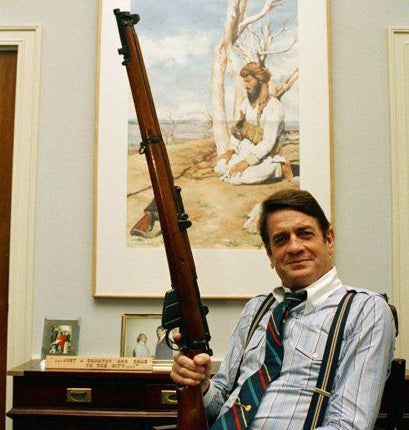Congressman Charlie Wilson dies
Charlie ‘Good Time’ Wilson supported mujahedin against Soviet troops

Your support helps us to tell the story
From reproductive rights to climate change to Big Tech, The Independent is on the ground when the story is developing. Whether it's investigating the financials of Elon Musk's pro-Trump PAC or producing our latest documentary, 'The A Word', which shines a light on the American women fighting for reproductive rights, we know how important it is to parse out the facts from the messaging.
At such a critical moment in US history, we need reporters on the ground. Your donation allows us to keep sending journalists to speak to both sides of the story.
The Independent is trusted by Americans across the entire political spectrum. And unlike many other quality news outlets, we choose not to lock Americans out of our reporting and analysis with paywalls. We believe quality journalism should be available to everyone, paid for by those who can afford it.
Your support makes all the difference.Charlie Wilson, the flamboyant former Congressman whose support for the mujahedin resistance to the Soviet occupiers of Afghanistan in the 1980s inspired the 2007 film Charlie Wilson's War, died in hospital yesterday in his native Texas. He was 76.
The careers of few legislators lent themselves to Hollywood as that of Mr Wilson. Hard-driving and fast-talking, who never hid his appreciation of women, liquor and the good things of life, he was known in Washington, where he served for 24 years, as "Good Time Charlie". Not only was he a Democrat elected in a conservative state, but also a liberal who supported abortion rights, a decent minimum wage and equal rights. However it was his efforts to procure secret funding for the Afghan rebels that earned him lasting political importance, and subsequently cinematic fame.
Before entering politics, he served in the Navy and as an intelligence officer at the Pentagon, specialising in the Soviet Union. His passionate interest in the mujahedin cause began in 1980, less than a year after the Soviet invasion of Afghanistan, when he read a news agency dispatch about the plight of refugees. Using his position on the House subcommittee in charge of appropriations for CIA clandestine operations, he engineered a doubling of the agency's budget for Afghanistan.
Over the next few years Mr Wilson channelled hundreds of millions of dollars to provide arms and assistance to the rebels, largely in the form of the shoulder-fired Stinger missiles that struck with deadly effect against the Russians' low-flying aircraft and helicopter gunships. "The US had nothing whatsoever to do with these people's decision to fight," Mr Wilson told Congress, "but we'll be damned by history if we let them fight with stones".
His commitment only increased when he visited refugee camps and hospitals in the region, where he saw the children and civilians who had been driven from their homes.
Nor was he repentant that the mujahedin became the basis for the Taliban who provided the base from which Osama bin Laden plotted the 9/11 attacks. Not to have helped them in the 1980s would have been akin to not helping the Soviet Union resist Hitler, he argued. "And anyway, who the hell had ever heard of the Taliban then?"
Join our commenting forum
Join thought-provoking conversations, follow other Independent readers and see their replies
Comments